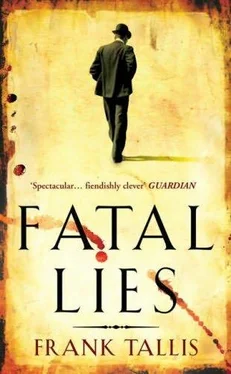Frank Tallis - Fatal Lies
Здесь есть возможность читать онлайн «Frank Tallis - Fatal Lies» весь текст электронной книги совершенно бесплатно (целиком полную версию без сокращений). В некоторых случаях можно слушать аудио, скачать через торрент в формате fb2 и присутствует краткое содержание. Жанр: Исторический детектив, на английском языке. Описание произведения, (предисловие) а так же отзывы посетителей доступны на портале библиотеки ЛибКат.
- Название:Fatal Lies
- Автор:
- Жанр:
- Год:неизвестен
- ISBN:нет данных
- Рейтинг книги:3 / 5. Голосов: 1
-
Избранное:Добавить в избранное
- Отзывы:
-
Ваша оценка:
- 60
- 1
- 2
- 3
- 4
- 5
Fatal Lies: краткое содержание, описание и аннотация
Предлагаем к чтению аннотацию, описание, краткое содержание или предисловие (зависит от того, что написал сам автор книги «Fatal Lies»). Если вы не нашли необходимую информацию о книге — напишите в комментариях, мы постараемся отыскать её.
Fatal Lies — читать онлайн бесплатно полную книгу (весь текст) целиком
Ниже представлен текст книги, разбитый по страницам. Система сохранения места последней прочитанной страницы, позволяет с удобством читать онлайн бесплатно книгу «Fatal Lies», без необходимости каждый раз заново искать на чём Вы остановились. Поставьте закладку, и сможете в любой момент перейти на страницу, на которой закончили чтение.
Интервал:
Закладка:
“Is that so?” Liebermann responded. “Extraordinary.”
Rheinhardt had walked over to the geological exhibits, where he renewed his acquaintance with the shiny black trilobite.
“Inspector,” Becker called out, “I would be most grateful if we could proceed expeditiously I am certain that you and your colleague”-he threw a contemptuous look at Liebermann-”must have many matters awaiting your urgent attention in Vienna.”
Rheinhardt rolled back on his heels. “Indeed.”
“Then shall we begin?” said Becker, talking across Liebermann.
Rheinhardt inclined his head in Liebermann's direction. “Please continue, Herr Doctor.”
“Thank you, Inspector,” said Liebermann.
Becker tossed the pen he was holding onto the table. It rolled away, declaring his hostility with each clattering revolution. In the ensuing stillness, the hissing of leaking pipes filled the air with an unnerving, serpentine sibilance.
“I trust your wife is well?” said Liebermann.
“Well enough,” Becker replied.
“She is fully recovered?”
“Recovered, Herr Doctor? She was never ill.”
“You said that she had been tearful… after our visit?”
“She was tearful… but that is no longer the case.”
“Good, I'm glad to hear it. Inspector Rheinhardt and I clearly misjudged the degree to which she had been affected by Zelenka's death.” Then, stepping back and looking out over the benches, Liebermann added: “So, this is where the unfortunate boy was discovered. Could you tell me where exactly?”
“There,” Becker pointed to the front bench.
Liebermann gazed at the empty floor space between two high stools.
“It is interesting, is it not,” said Liebermann, imitating the manner in which he had seen Professor Freud begin his lecture the previous evening, “that we often appropriate the word ‘chemistry’ when language fails to furnish us with terms adequate to the task of describing the mysteries of love. We are often unable to say why it is that one relationship works and another doesn't. We say that the chemistry is right, or the chemistry is wrong, or perhaps that the chemistry is absent! This instinctive appropriation acknowledges that love is a very physical experience: it quickens the pulse and the breath… tears fall. Ironic ally, love-the most transcendent of all emotions-reminds us that we are mortal. I am of the opinion that our deepest passions are animated by a fierce chemistry, the reactions of which-by virtue of their association with corporeal processes-bring us inexorably closer to death.”
Becker tilted his head, and his spectacles became circles of opaque brilliance. “I am sorry, Dr. Liebermann,” said Becker. “But I really haven't a clue what you're talking about.”
“Do you believe that there is a chemistry of love, Herr Doctor Becker? There is certainly a chemistry of death.” Liebermann positioned himself between the first two benches and leaned forward, supporting his weight on outstretched arms. “We are-as yet- ignorant of the substances that create bonds of affection, but we are not so ignorant of those that extinguish life.”
Becker glared at Liebermann, but said nothing.
“How, I wonder,” Liebermann continued, “would you describe the bond of affection that existed between Frau Becker and Thomas Zelenka? Is it enough to say that they were fond of each other? That they were friends? Or do you think we would do better to borrow once again the most potent of scientific metaphors. I am disposed to believe that they shared a chemical affinity.”
The deputy headmaster suddenly turned around and faced the wall.
“Frau Becker and Thomas Zelenka,” Liebermann continued. “They were lovers, weren't they?”
“Yes, they were lovers!” Becker exploded. “Are you satisfied now, Dr. Liebermann? Are you satisfied, now that I have admitted it? Now that I am shamed?”
Liebermann's reply was delivered with clinical neutrality. “It was never my purpose to derive any pleasure from your misfortune. I merely desired to establish some important facts.”
“Well, there you are! You've succeeded! And what of it?”
Liebermann did not respond. He simply waited. With every passing second a subtle pressure mounted-a tacit demand for explanation. It seemed to weigh down on Becker until resistance was no longer possible. The deputy headmaster raised his hands, and then let them fall-a gesture that suggested both defeat and anger.
“Poldi was never happy here,” he blurted out. “Right from the beginning. I could do nothing to raise her spirits. She spent half my monthly salary in the shops on Karntner Strasse-and she was still inconsolable. She expected too much-from me, and from Saint Florian's. We became more and more estranged, and as we did so, she became more and more obsessed with the boys-the bullying, the persecution. She made a complete fool of herself in front of the other masters’ wives-attempting to foment some kind of women's revolt! It was utterly absurd. She came perilously close to losing me my position! Had I not remonstrated with her in the strongest possible terms…” Becker hesitated, and the shadow that passed across his face intimated violence. “My prospects at Saint Florian's would have been irrevocably damaged! Zelenka exploited her sympathy-and he did so at a time when our marital relations were at their worst. His presence at the house became an embarrassment. Even the staff made jokes about it. Can you imagine what that is like, Herr Doctor? To have the gardener, the cook, the maid sniggering behind your back-enjoying the spectacle of your humiliation.”
“Then why didn't you put a stop to it?” asked Liebermann gently. “Why didn't you prohibit Zelenka's visits?”
“To what end? By the time I had discovered their secret, it was too late. What good would it have done, Herr Doctor, had I acted in such a way as to draw even more attention to my predicament? What good? I am a rational man-a civilized man. I decided to conduct myself in a dignified fashion. Zelenka intended to join the civil service in the summer. I knew that Poldi would follow him…It was simply a question of biding my time until then.” Becker glanced back at Liebermann. “Well, there it is, Herr Doctor. You've had it out of me.” His gaze took in Rheinhardt, and he added, “I trust you will both say nothing of this to anyone.”
“And what of your marriage now?” asked Liebermann.
“I don't know. Poldi and I do not talk… not as a husband and wife should; however…”
“You still nurse a hope that-notwithstanding what has transpired-your marriage might yet survive?”
“I am not so naive, Dr. Liebermann, as to think that just because Zelenka is dead all will be well again. Zelenka was a consequence, not a cause. Our estrangement had begun long before Poldi and Zelenka discovered their… chemical affinity; however, since Zelenka's death, I believe Poldi has changed-a little. We have-of late-been more civil with each other. Perhaps Zelenka's death has made her realize that life is precious and that we are sometimes obliged to make the most of what little we are given. And if I can find it within myself to forgive her… then, yes, it might not be so foolish to hope for some form of reconciliation.”
Liebermann sighed, joined his hands together, and allowed his fingers to bounce on his lips.
“And there we might leave it,” he said, his sentence-like an imperfect cadence-failing to find a satisfactory resolution. “Were it not,” he then continued, “for the almond tart.”
Becker started. “I beg your pardon?”
“The almond tart that you instructed your wife to purchase on one of her many trips into town. You may not know this, but she bought it at the Royal and Imperial Bakers. If you had eaten it, I dare say you would have recognized its very superior qualities- the lightness of the pastry, the moistness of the sponge, the subtle lemon and anise flavorings, and the burnished, sweet caramelized almonds. But, of course, you didn't eat it. Instead, you placed it next to Zelenka's dead body-right here”-Liebermann rapped the bench top-”before rushing upstairs to meet with the headmaster. Is that not so?”
Читать дальшеИнтервал:
Закладка:
Похожие книги на «Fatal Lies»
Представляем Вашему вниманию похожие книги на «Fatal Lies» списком для выбора. Мы отобрали схожую по названию и смыслу литературу в надежде предоставить читателям больше вариантов отыскать новые, интересные, ещё непрочитанные произведения.
Обсуждение, отзывы о книге «Fatal Lies» и просто собственные мнения читателей. Оставьте ваши комментарии, напишите, что Вы думаете о произведении, его смысле или главных героях. Укажите что конкретно понравилось, а что нет, и почему Вы так считаете.












